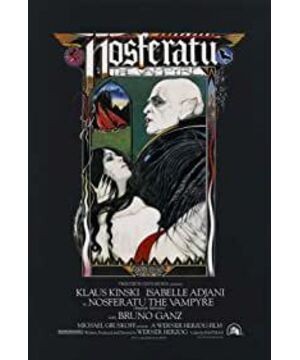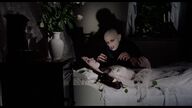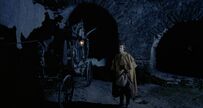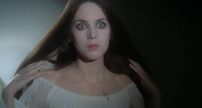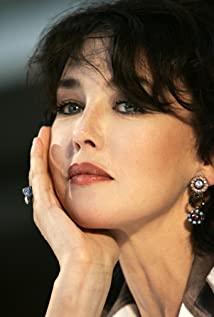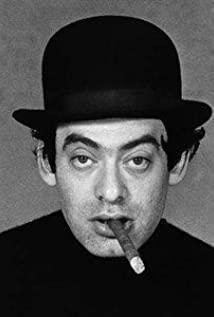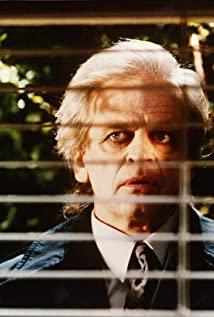"Nosferatu" begins with death and finally resurrects. The long shot at the beginning of the film, accompanied by a very oppressive orchestral music, really shocked people when they came up. The camera scans the pale faces of older or younger corpses, suggesting that death is the destiny that humans cannot escape. But at the end of the film, it is the vampire who turns into the hero Huck and returns to his home on horseback. Therefore, this story became a reverse metaphor for the resurrection of Jesus. According to God's law, people must wait for death and accept judgment after death. But what if a person does not die? Or was he resurrected in an alternative way after his death? Those who fled the kingdom of God must be declared as demons, so good and evil, evil and righteousness, darkness and light have become the usual patterns in stories like vampires.
It is said that Herzog’s film is a tribute to the Munau version of the work of the same name. Indeed, the Munau version provides a basic paradigm for vampire stories. But Herzog obviously has his own opinion. Under his lens, vampires are not only fighting against God’s law, but also proclaiming human beings: don’t look at human beings establishing a science-based kingdom of reason, but taking science Respect for faith can only make human eyes blind, and what follows is the nihility under modernity.
Back to the movie. Nosferatu, the well-known Earl Dracula, lived in a castle in a steep valley in Romania, where the mountains were steep and the rivers turbulent. His lineage is ancient and noble, he wears a neat black cloak all the year round, and meticulous; his nails are long and courteous. If these descriptions appear in marriage advertisements, there will surely be a lot of women's desires and desires to agree with each other. At least, Huck would think that the earl must be a respected elder. So he became a good-bye wife and set off for the Romanian castle.
Before Huck arrives at his destination, the whole movie is more like a beautiful documentary of the German countryside, with green grass, towering mountains, enthusiastic gypsies and hospitable innkeepers. At this time, the background music is also brisk and beautiful. At night, Huck successfully checked into Dracula’s Castle. Kinsky appeared to be wearing a hat, and he was really a loyal elder in the dark. In the living room, the classic image of Earl Dracula gradually appeared under the dim light of white candles. It was a light brain shell, bat ears, cat-shaped claws, and pointed incisors similar to the Murnau version of Dracula. But Kinsky's appearance is more melancholy, which is the result of deep eye sockets caused by his never going to sleep. He looked like a zombie, but his impulsiveness was like fire. The blood that Huck accidentally cut through his fingers ignited the earl's bloodthirsty wildness. The earl wanted to go in and stopped, but after all he couldn't help but rushed to suck the bleeding finger.
But all this, Huck thought it was "a dream" in the home letter written by Huck the next day. This detail reminds us that Huck is in the era of establishing the kingdom of reason after the Enlightenment. Science arrogantly took the scepter of God and sat on the throne of faith, so Huck didn't even think of the demons and ghosts. Until the second night, when the head of Huck’s wife was seen by the earl, the earl touched the head with his nails and subconsciously said "what a beautiful neck". This sentence made Huck suddenly feel a sense of fear. Men are always extra sensitive on women's issues, and this sensitivity is often surprisingly correct. When Huck woke up from under the earl's teeth, he found that the earl had already boarded the boat bound for Wismar. This time, he was really terrified.
At this time, the earl had already ruled the ship with death and drove the ship to Wismar, leaving behind the coffin in which he lived, countless rats with the Black Death, and the captain's unfinished logbook. The log reminded people in the city that the plague had arrived, but it was too late. The Black Death swept the city. The portrayal of the Black Death is particularly different from the Munau version of Herzog. Herzog frequently used long shots to show the various forms of the city under the ravages of the Black Death: at first, there were only three or four coffins; later one after another coffins were carried from all sides to the square in the center of the city; and then they did not. Then there are coffins, and those who haven't died indulge in carnivals in the square. The citizens put on the last supper among the swarms of mice, and still drank a glass of red wine in the most elegant manner, ignoring the existence of death and sorrow. This is quite reminiscent of Camus's famous "The Plague", but what Herzog implied seems to be the eternal presence of evil. This is no longer the ignorant Middle Ages, but the scientific modernity, but humans still cannot escape the curse of death and the ravages of evil. why? Is there nothing science can do?
Soon, Huck was also sent home, but after being sucked blood, he could no longer recognize his wife Lucy in front of him. The representative of science and reason, Dr. Van Helsing, thought that Huck was just meningitis. He tried to use science to explain the death of a large number of people, but to no avail. Only Lucy discovered the secret of the vampire, but it was a pity that her screaming voice was just the cold "superstition" in Dr. Van Helsing's mouth. So Lucy had to sacrifice herself to kill the vampire. There is a very interesting conversation at this time. When the vampire asked Lucy for some warm love, Lucy replied: "No one can replace my love for my husband, nor can God." This sentence shows that Lucy puts love in the highest position. Love turned out to be the only weapon against evil after the death of God.
In this way, the clues of the whole film come together: the evil represented by the vampire, the love represented by Lucy, and the science represented by Van Helsing. Of course, at this time God is dead, what will be the end of the confrontation between these forces?
The 24-year-old Adjani lay on the couch and seduce Dracula with her body and blood until the first sunlight in the morning killed him, and the city was saved. This is the power of love, but this love is also annihilated. Although Dracula died, the evil did not disappear but turned to Huck, becoming a new vampire. As for Van Helsing, he has to admit that science has failed in this competition and that Lucy is right. Who is the winner? We can only say that love and evil are tied, but evil still exists, so love also exists.
In fact, vampire legends were not particularly popular in the Middle Ages, and vampires were fixed as a term very recently. The reason why Herzog did not adopt the ending of the Murnau version of the film was because of the consistent theme of his film: In modern society, should we admire reason and science infinitely like the waters of the Yellow River? Doesn't technological progress leave any room for things like darkness, mystery, pantheism, and love?
Just as he used the savage Hober to deny modern civilization such as science and reason in "Everyone Loves Himself, God Against Everyone", "Nosferatu" also uses the immortal legend of vampires to fight against the blindness of science and reason. superstitious. The era of the New German Film Movement was exactly the era when existentialism originated in Germany prevailed in Europe. I think Herzog might use the lens to express his existentialism: when God dies, science becomes the belief of modern people, but the original mysterious, subtle, and emotional mind of mankind gradually dried up and became nothingness. At this time, evil will take advantage of the emptiness to enter and erode people's hearts. Yes, God is dead and the vampire is still alive. What can we do besides love?
Published in the 9th issue of "Watching Movies" in 2009.
View more about Nosferatu the Vampyre reviews


